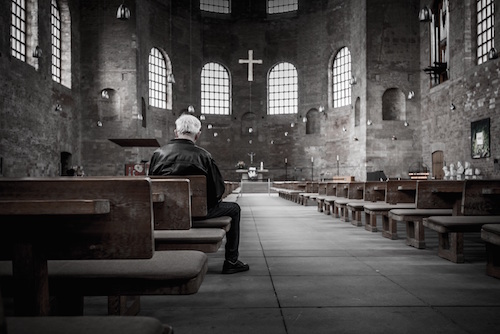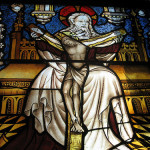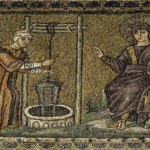We run our website the way we wished the whole internet worked: we provide high quality original content with no ads. We are funded solely by your direct support. Please consider supporting this project.

The Cruciform Trinity
As paradoxical as it sounds, if God is supremely revealed when he stoops to the infinite extremity of becoming his own antithesis on the cross, then we must conclude that stooping to this extremity out of love must, in some sense, be intrinsic to who God eternally is. And rendering this coherent necessitates that we understand God’s revelation on the cross in Trinitarian terms.
The orthodox doctrine of the Trinity states that from all eternity, and apart from any relationship with others outside himself, God’s exists as three Divine Persons who fully pour themselves out for one another and who fully dwell within one another in perfect love. In my opinion, this pouring out and mutual indwelling was best expressed in the Cappadocion doctrine of the “perichoresis” of the three Persons and, with von Balthazar and Moltmann, I understand the eternal act of each divine Person completely giving themselves to the others in love to entail a sort of self-emptying (kenosis) in the very essence of God. (See J. Moltmann, The Trinity and the Kingdom: The Doctrine of God, 58-60, 118-9; von Balthasar, Love Alone, 86-9.) Indeed, if the self-emptying of God to become a human and to die on the cross (Phil 2:6) reveals God’s eternal nature, there must be something corresponding to this self-emptying within the eternal Godhead.
This means that, when the Son emptied himself to identify fully with our limited humanity, our sin, and our God-forsakeness, he was not doing something that was alien to God’s eternal nature. Rather, as Bauckham puts it, “[i]n this act of self-giving God is most truly himself and defines himself for the world.” The perfect, humble, other-oriented love that is displayed in the self-emptying of the Incarnation and Crucifixion, considered as one revelatory act, reveals God precisely because it reflects what God is like within himself and throughout eternity. Torrance argues that, “the atoning act perfected in the cross of Jesus Christ is grounded in the very being of the eternal God, that is, in the eternal being of the Holy Trinity.”
We can, in fact, take this a step further by noting that, in pouring himself out to the point of experiencing his own antithesis, God was not only not doing something that was not alien to himself: he was rather enveloping humans into the same pouring out and mutual indwelling of the three divine Persons that constitutes his eternal essence. And this incorporation is how God makes his eternal nature known to us and how he thereby saves us. We are not only made beneficiaries of God’s self-giving love; we are made “participants of the divine nature” (2 Pet 1:4). By being placed “in Christ” (e.g., Eph 1:3-9) we are by grace becoming participants in the loving oneness of the Father and Son (Jn 17:21-3). Hence, in Christ we are loved by the Father with the same perfect love the Father has for his Son (Jn 17:26; Eph 1:6) and (what comes to the same thing) we are given the same “glory” the Father gives to Jesus (Jn 17:24).
When the Son stooped to the infinite extremity of identifying with our sin and experiencing our God-forsakenness, he was manifesting, and incorporating us into, the perfect, loving holiness and unity that he eternally enjoys with the Father and Spirit. He became our wrong-relatedness to God (sin) in order to incorporate us into his eternal right-relatedness with God (righteousness, 2 Cor 5:21). Hence, we must conclude that the triune God reveals who he truly is, and allows humans to participate in who he truly is, precisely when God, out of love, stoops to becoming his own antithesis. And this is why God’s unsurpassable accommodation of our limitations and sin on Calvary constitutes the ultimate revelation of the triune God. The Trinity is thus not only the presupposition of the intelligibility of God’s revelation on the cross; it is also the content of what is revealed and shared with us on the cross.
Image by Stefan Kunze
Category: General
Tags: Character of God, Crucifixion, Jesus, Kenosis, Love, Trinity
Topics: Trinity
Related Reading

Was Jesus Abandoned by the Father on the Cross?
As Jesus hung on the cross, he cried, “Eli, Eli, lema sabachthani?” (Mt 27:46). This is the cry of our God who stooped to the furthest possible depths to experience his own antithesis, as the all-holy God becomes the sin of the world (2 Cor 5:21) and the perfectly united God becomes the curse of…

The Incarnation as an Example of Cross-Cultural Love
Beautiful Faces of Palestine via Compfight Christena Cleveland wrote an excellent piece about the radical cross-cultural nature of the incarnation. I’ve never thought of it quite this way before, but the incarnation is the most profound instance of entering into another culture in a selfless way. Moving outside of our “cultural comfort zone” to more…

God is Not a Monster
Pastor Brian Zhand has a way with words that captures the imagination. And he is a pastor that has taken time to read the church fathers. In a recent post, he quotes Saint Antony who wrote, “I no longer fear God, but I love him. For love casts out fear.” Brian confronts the common misconceptions and images of God that…

The Cruciform Center Part 2: How John’s Gospel Reveals a Cruciform God
In the previous post, we looked at how the Synoptics illustrate the centrality of the cross. While the Gospel of John varies in its structure and language from the Synoptics, the cross remains at the center. This centrality is expressed in a number of different ways. 1. The role that Jesus’ death plays in glorifying…

The Missing Jesus
Jonathan Martin wrote this compelling blog on the missing Jesus last month. It’s a thoughtful reflection on how easy it is to put Jesus in a box that conforms to our political, religious or social agenda. But the real Jesus is not an idea; he’s a person. And he’s a person who is constantly breaking…

Jesus and the “Favored Nation”
Nationalism lies at the heart of the Old Testament narrative. This concept is intimately wrapped up with the law-oriented covenant God made with the Israelites at Mount Sinai, for at the heart of this covenant is the promise that obedience would bring national security while disobedience would bring national disaster (Deut. 27-28). What we shall…
